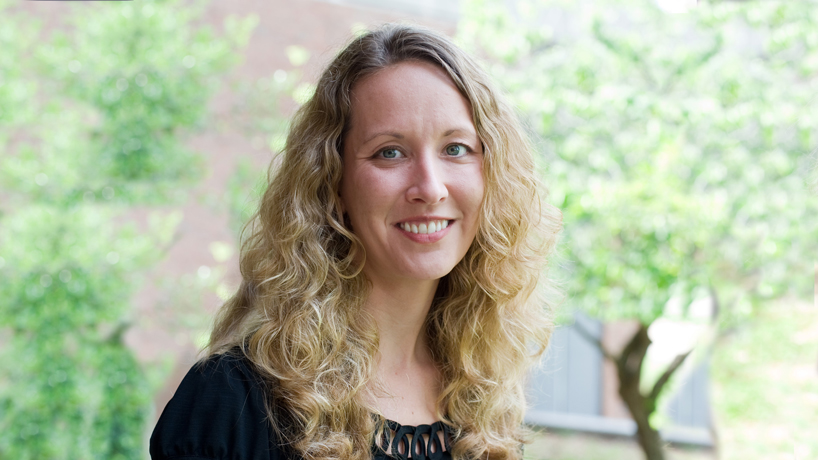
University of Missouri–St. Louis Associate Professor of Psychological Sciences Zoe Peterson has founded the Sexual Assault Research and Education program in efforts to expand the scope and efficacy of research on sexual offense and prevention methodologies. (Photo by August Jennewein)
Based on her review of the existing research, Zoe Peterson has found that the majority of sexual assault prevention strategies place the responsibility of stopping the offense on the victim rather than focusing on ways to change the perpetrator’s behaviors.
“A lot of prevention work is done with programs targeting potential victims in a manner of ‘So here’s how to avoid sexual assault,’” said Peterson, associate professor of psychological sciences at the University of Missouri–St. Louis. “It’s not that that’s not useful, but ultimately the goal should be primary prevention — stop the people who are perpetrating the sexual assault. We need more research aimed at potential perpetrators to answer questions like what motivates them? How can we change negative and destructive mindsets before someone is hurt?”
In an effort to expand the scope and efficacy of research on sexual offense and prevention methodologies, Peterson has founded the Sexual Assault Research and Education program. Among other goals, this initiative aims to conduct and disseminate high-quality research on the topic of sexual assault and actively collaborate with prevention programmers, victim advocates, clinicians and Title IX staff.
Peterson’s years as a Clinical Research Postdoctoral Fellow at The Kinsey Institute for Research in Sex, Gender, and Reproduction proved instrumental in her focus on using strong data to corner and solve pressing social problems
“The Sexual Assault Research and Education program will collaborate with researchers across disciplines, consolidate research findings and offer prevention organizations the best empirically supported strategies to inform interventions,” she said, “Understanding the factors that contribute to sexual assault will ultimately help to keep people from experiencing sexual assault or engaging in harmful sexual behaviors.”
So far, program affiliates include UMSL faculty members Steven E. Bruce, Michael G. Griffin, Kathryn Records and Rick Zimmerman, a solid core of UMSL graduate students and professors from national and international universities. Professional and student researchers are using methods such as self-report surveys, laboratory experiments and FMRI analyses to gather data.
“Researchers in the field have found men who drink more alcohol, use more drugs, have hostile attitudes toward women and who are in peer groups that condone sexual assaults are more likely to be perpetrators,” she said.
Another point of concern is helping those at risk of being sexually assaulted and those of risk for assaulting to understand the importance and function of consent.
“People believe there’s a clear demarcation between sex that’s consensual and rape, but consent is fuzzy in many cases,” Peterson said, “There are a lot of coercive behaviors that fall somewhere between sex and stereotypical forceful rape. A lot people who this happens to don’t realize what happened to them is rape. Fifty percent of persons who have experienced something that legally qualifies as rape don’t consider what happened to them to be rape.”
As the findings develop, UMSL College of Arts and Sciences Dean Ronald E, Yasbin has great expectations for what Peterson and the Sexual Assault Research and Education program can accomplish.
“Dr. Peterson has a long and distinguished record of doing research in this area,” he said. “Her research not only deals with discovering the magnitude of the problem but also with elucidating the factors that enhance the possibility of sexual assaults,” said Yasbin. “Mechanisms that change risk factors and behavioral patterns hold the greatest promise for reducing the incidence of such sexual assaults. We have to change mind sets that don’t understand the reality of the damage caused by abusive behavior, and we are confident that the existence of this program will promote a greater awareness of the problem.”
Peterson hopes as well that over time the empirical data she and her colleagues discover will have a positive impact on mindsets surrounding sexual assault.
“College campuses are a smaller culture where we might have more power to change what is done in culture at large,” she said. “We can make damaging behaviors less acceptable and change attitudes surrounding them.”
A Huffington Post interview featuring Peterson can be found here. For more information on the Sexual Assault Research and Education program, contact Peterson at petersonz@umsl.edu.















